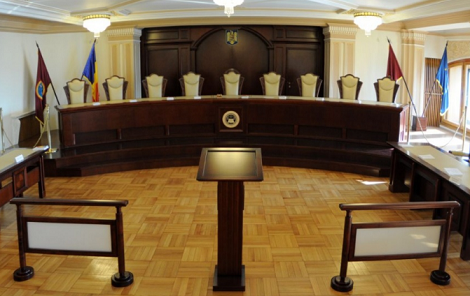 The Chamber of Deputies passed Tuesday by 178 votes „for”, 39 „against” and 51 abstentions, the bill that provides increased immunity to CCR judges. They cannot be anymore prosecuted, detained, arrested, searched or prosecuted without the consent of two-thirds of the Court judges.
The Chamber of Deputies passed Tuesday by 178 votes „for”, 39 „against” and 51 abstentions, the bill that provides increased immunity to CCR judges. They cannot be anymore prosecuted, detained, arrested, searched or prosecuted without the consent of two-thirds of the Court judges.
The law will go to the Senate.
What immunity the CCR members enjoy now:
Article 66 of the Law on organization and functioning of the Constitutional Court states:
„Constitutional Court judges cannot be arrested or criminally prosecuted but only with the approval from the Permanent Bureaus of the Chamber of Deputies and the Senate or the Romanian President, as appropriate, at the request of the General Prosecutor of the Prosecutors’ Office attached to the High Court of Cassation and Justice.”
How article 66 will change and what immunity they are going to have:
„Constitutional Court judges cannot be prosecuted, detained, arrested or searched or criminally prosecuted but only with the approval of the Constitutional Court plenum…
The approval mentioned in the preceding paragraph is given by the vote of two-thirds of the Constitutional Court judges, after hearing the judge in question.”
It means that the CCR magistrates would become the officials with the most extended immunity, as they would benefit on the one hand of an immunity similar to the ministers’, but increased: according to the law on the responsibility of ministers, they cannot be investigated without the approval of the President or the chamber where they are members, if they are MPs.
It should be noted that the ministers’ immunity relates only to acts committed in that capacity, while for the CCR magistrates it is not specified anything like that.
On the other hand, we should mention that for the parliamentarians, there is no need to waive the immunity unless it is a case of arrest and not for investigations.
In addition, while for waiving the parliamentary immunity the vote of the majority would be needed, for the CCR judges, the approval of two-thirds of the full Court would be required.
Also, the judge indicted for criminal charges can be suspended by a decision of the CCR plenary adopted by two-thirds of the CCR members.
Arguments brought forward by law initiator
The prime argument invoked in the explanatory memoranda is the urgent need to establish „concrete and distinct measures that would eliminate, beforehand, any possibility of exerting pressure on the Constitutional Court judges„.
Adnagi Slavoliub, the initiator, believes that his bill would allow the CCR judges to enjoy an immunity symmetrical to that applied to ministers and parliamentarians.
Other facilities of law:
The bill offers the CCR judges one more gift by proposing to add a new paragraph to article 69.
In the current version of the law, article 69 states:
„After ending the office mandate following the expiry of the period for which it was granted, the judge has the right to return to the position previously held if his appointment to the Constitutional Court has been made with the preservation of that position.
(2) If the judge previously held a magistrate position, the job preservation is compulsory.
(3) In the period during which the position mentioned in para. (1) and (2) is preserved, it can be occupied only under a fixed-term employment contract.”
The bill approved Tuesday by the Legal Committee of the Chamber of Deputies proposes a new paragraph (4) to be added:
„After ending the office mandate following the expiry of the period for which this mandate has been granted, the Constitutional Court judge may opt to join the law or the notary activity, without a prior exam.”
Full term mandate for those who replace a judge who retired in the meantime
The way to calculate the mandate of the person appointed for the rest of the mandate term of another judge (deceased or who retires forced by circumstances – ill, convicted, etc.) also changes:
- until now, the appointment was for the remainder of the term
- an amendment made by the former Minister of Justice Florin Iordache and adopted Tuesday says that the mandate will be fully
Higher pension
The law approved by the members of the Chamber of Deputies also proposes a new formula to calculate the pension of the CCR judges, more advantageous than the one used for other magistrates who anyway enjoy what is called a luxury pension (pension exempted from the rule of strict relation to the contributions paid during the work activity):
„The Constitutional Court judges with an experience in the judicial work or in the higher legal education of at least 25 years, regardless of age and date of retirement benefit, on request, of a service pension equal to 80% of the calculation base represented by the gross monthly employment allowance and the bonuses.
For each year that exceeds the specified length of service, 1% of the calculation base is added to the pension amount, without exceeding this base. This pension shall be updated in relation to the gross monthly employment allowance and the related bonuses of the Constitutional Court judges„.
Also, the CCR judges are entitled to a diplomatic passport, the law states.









